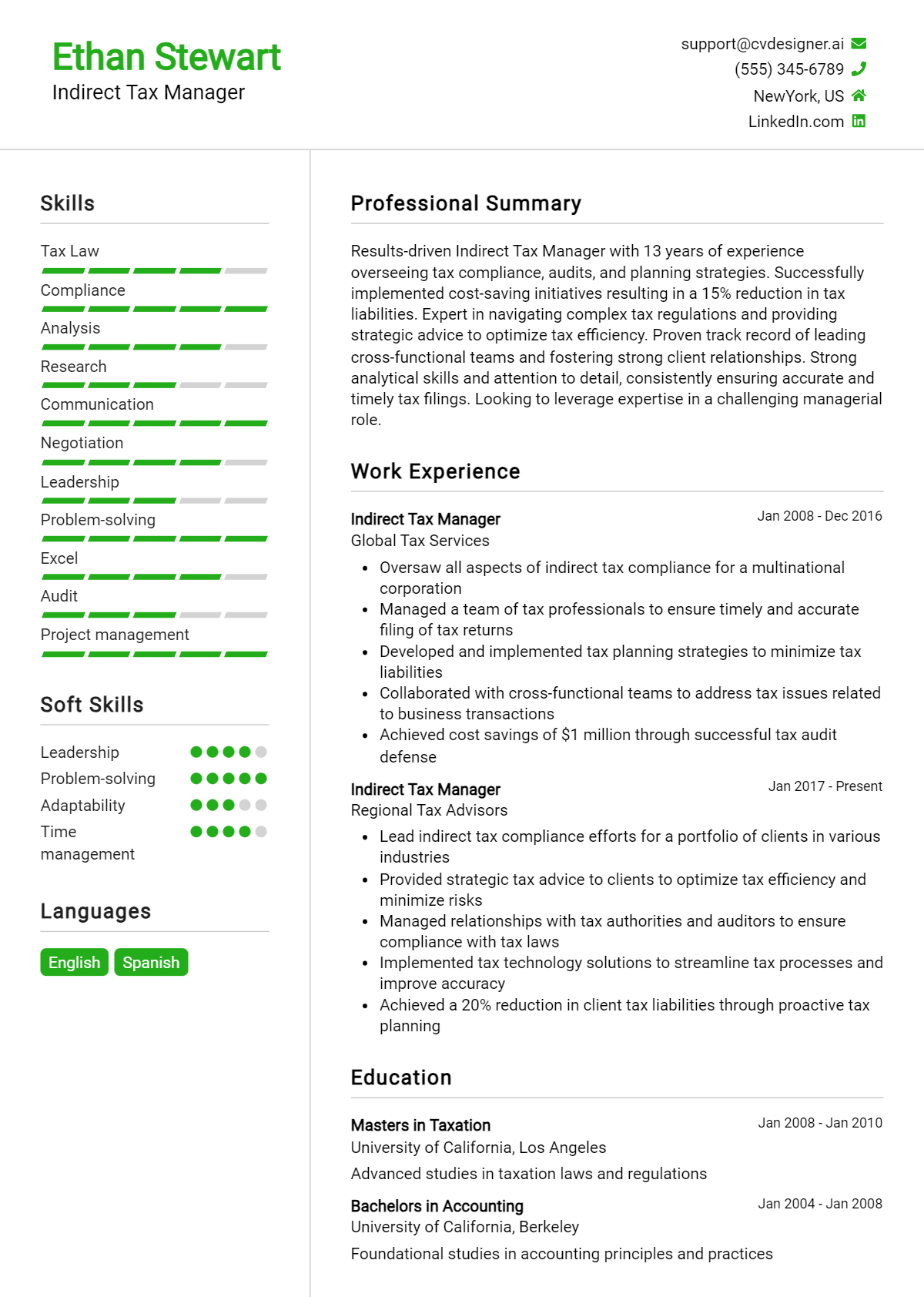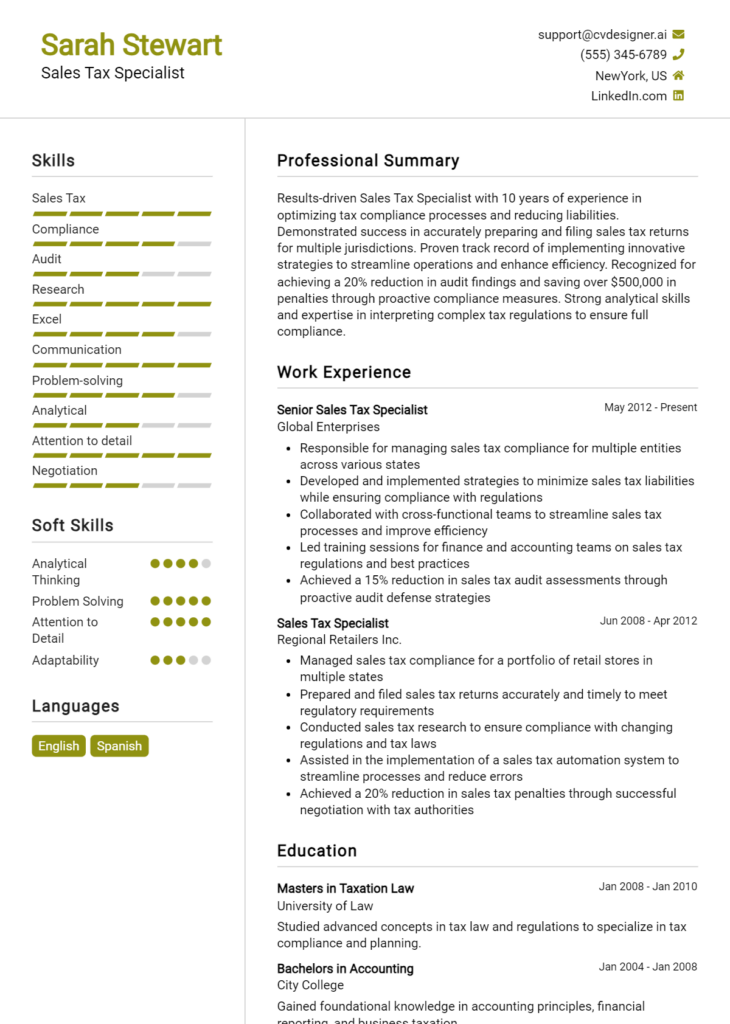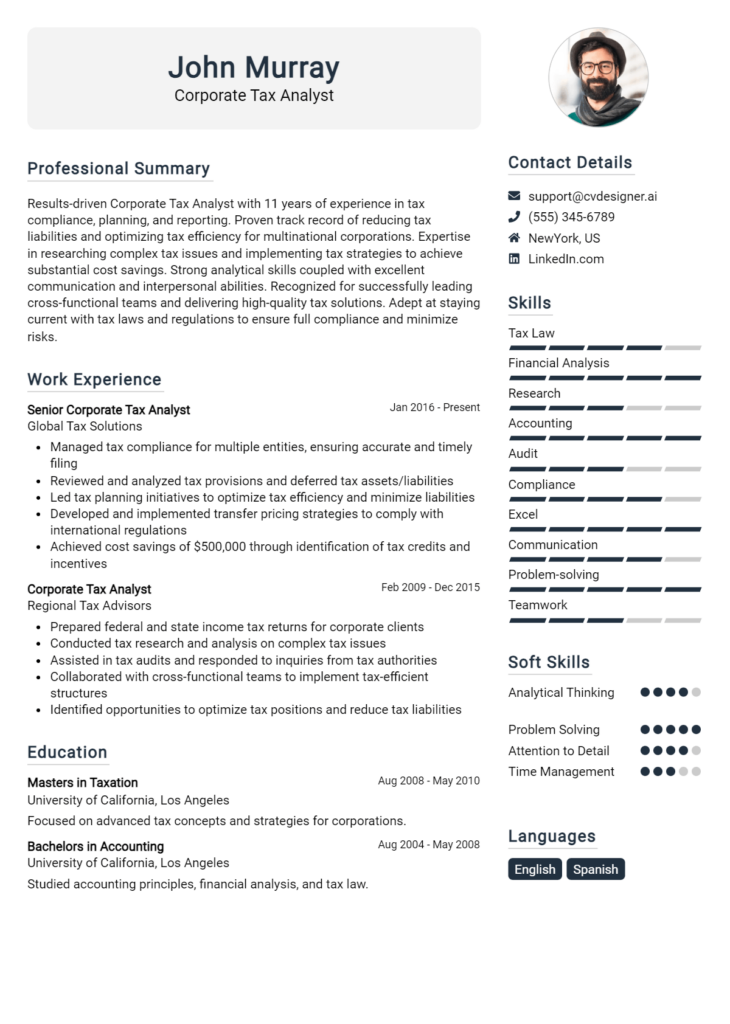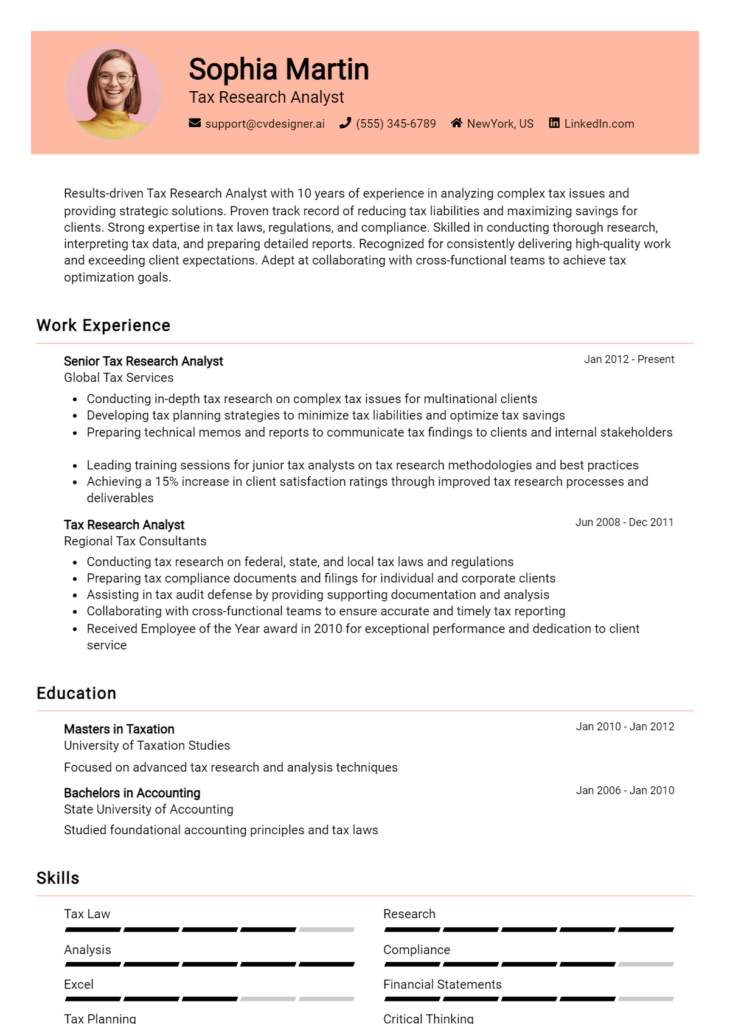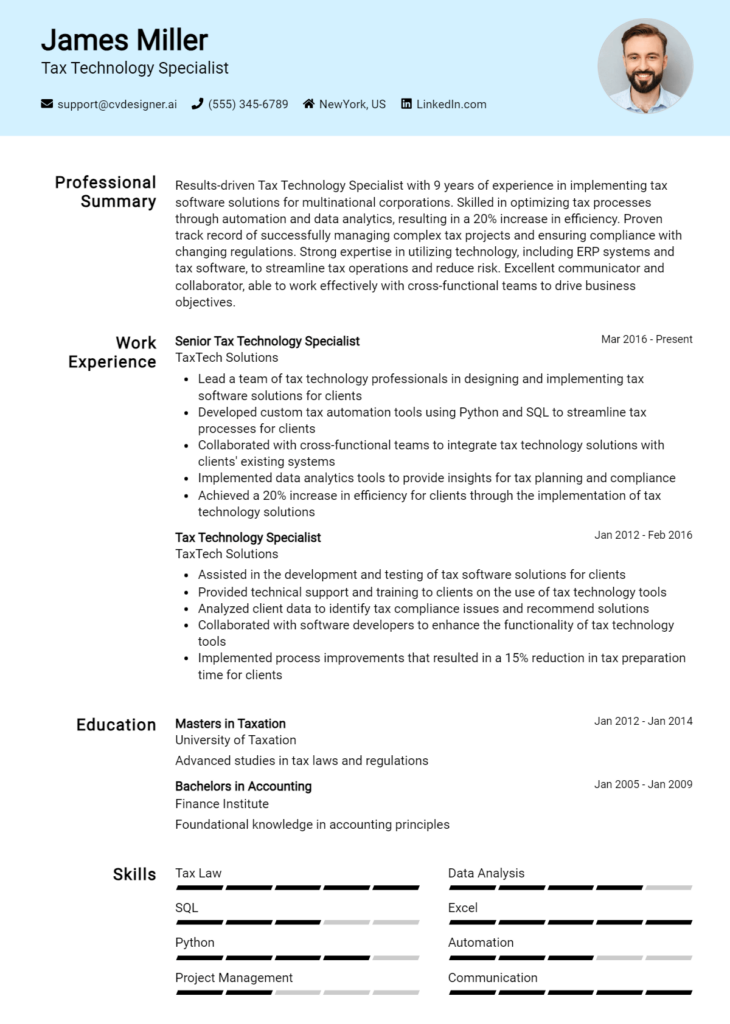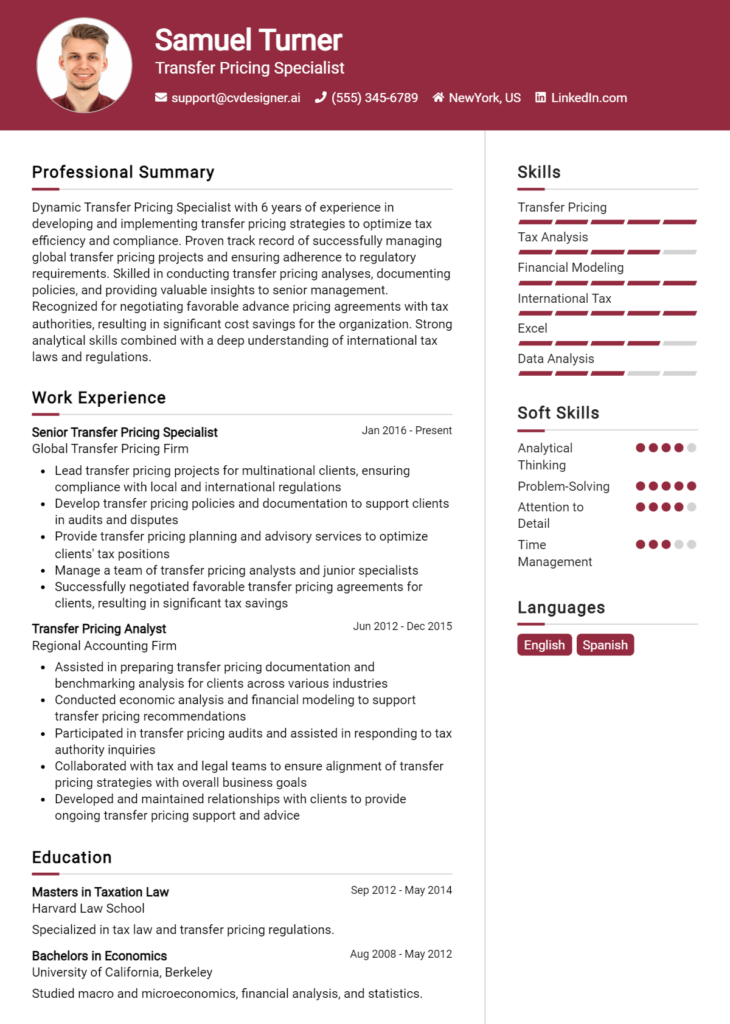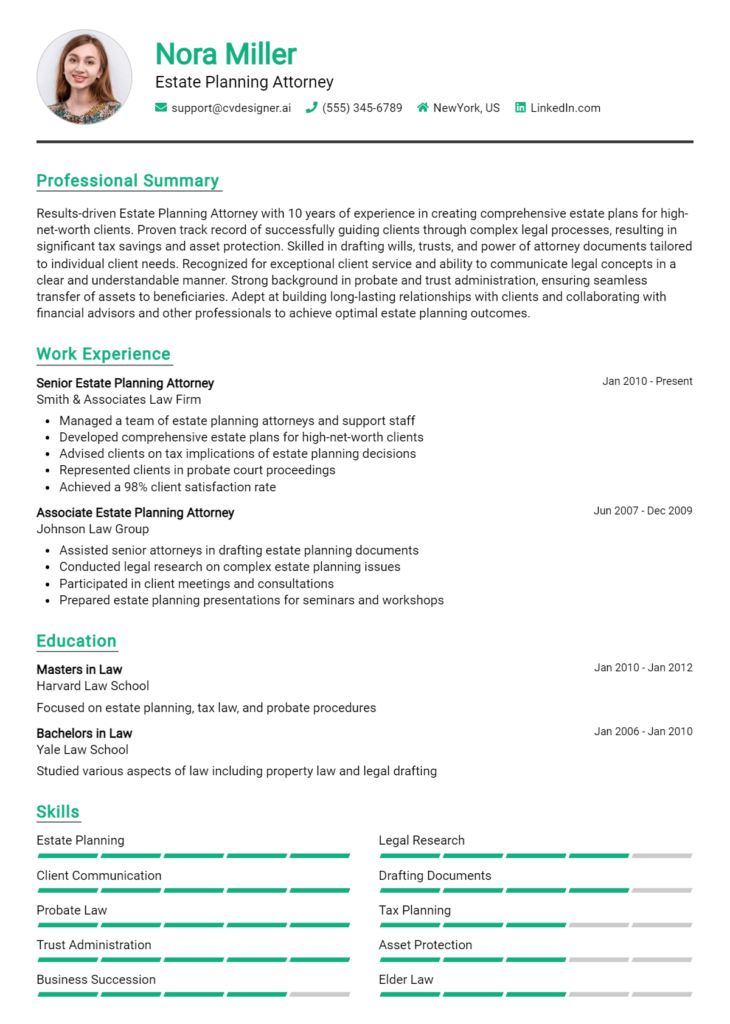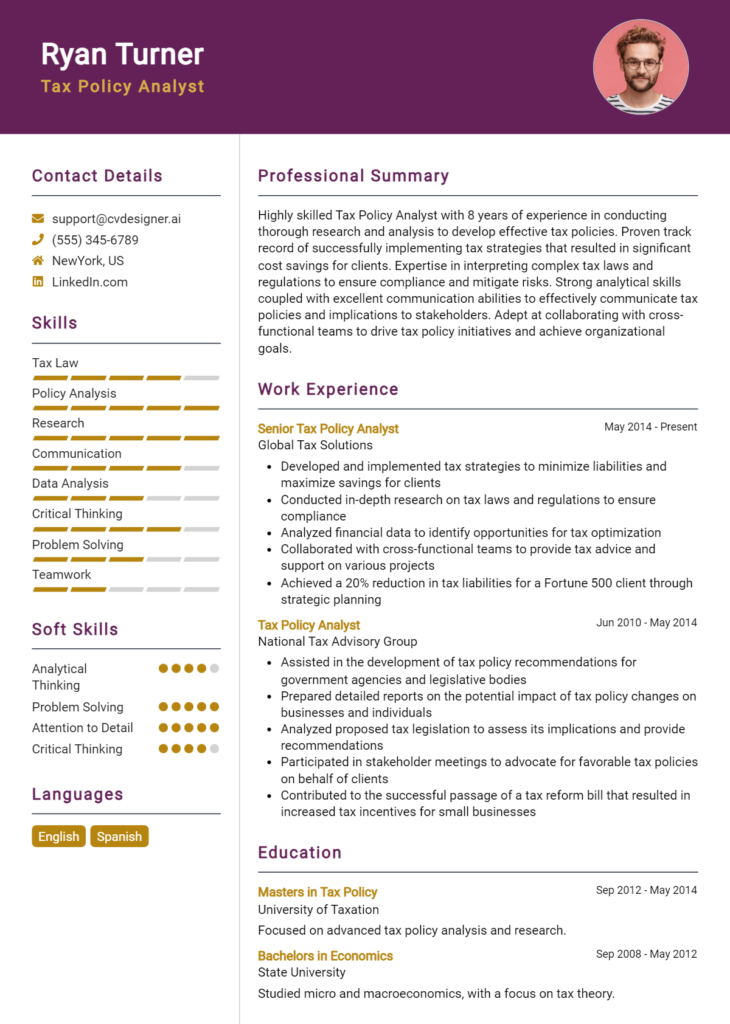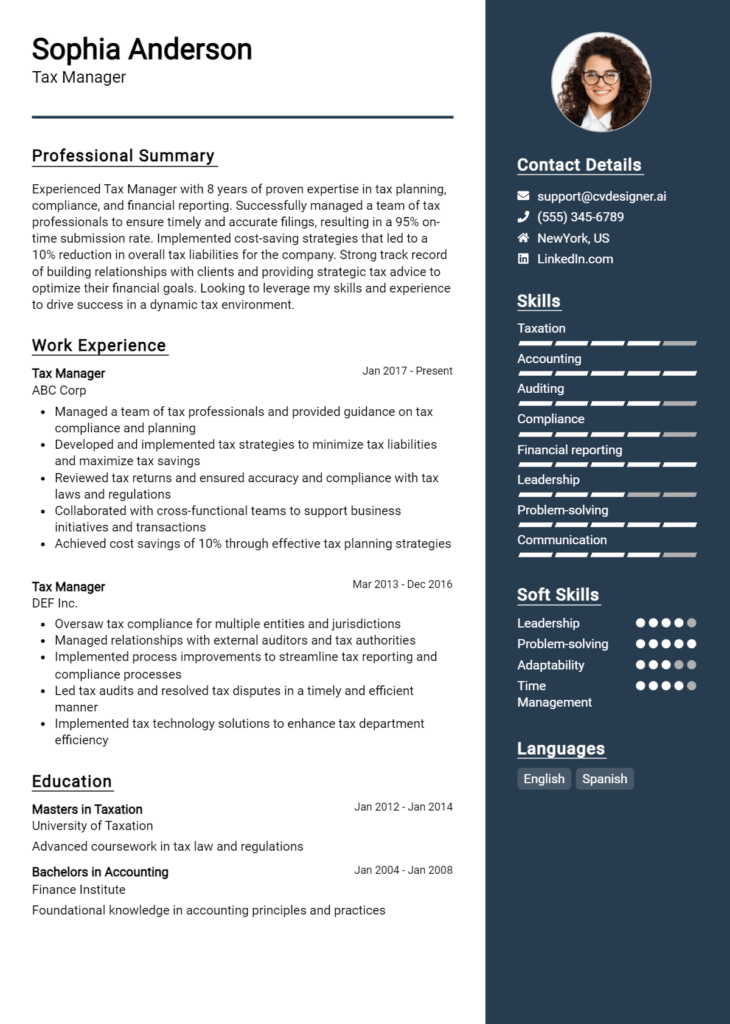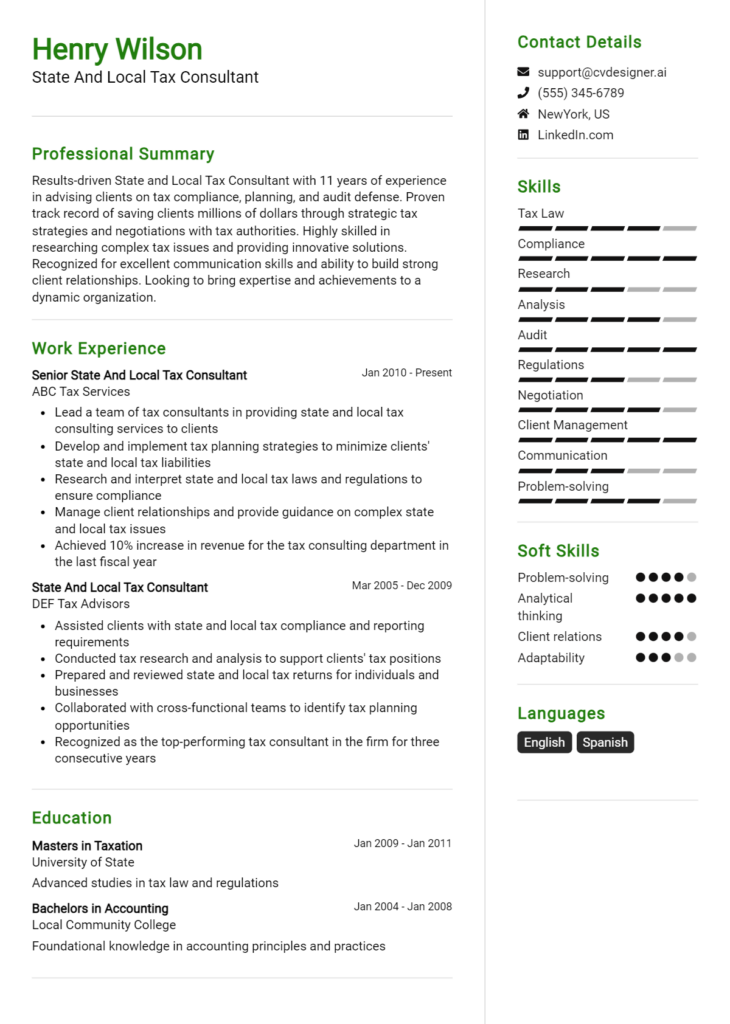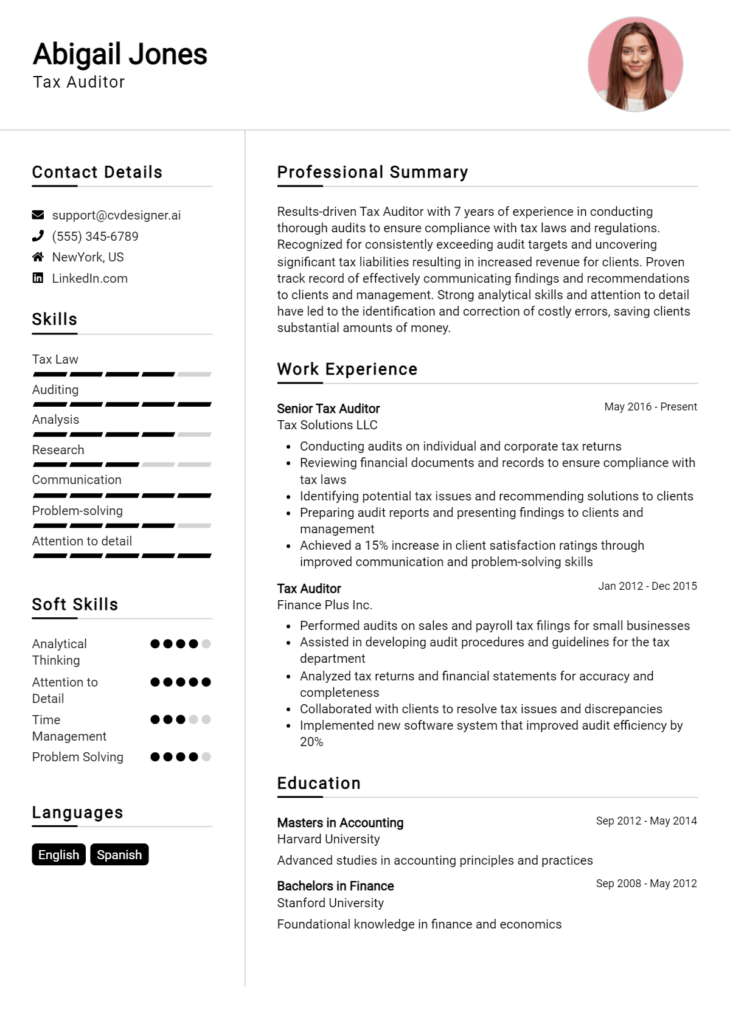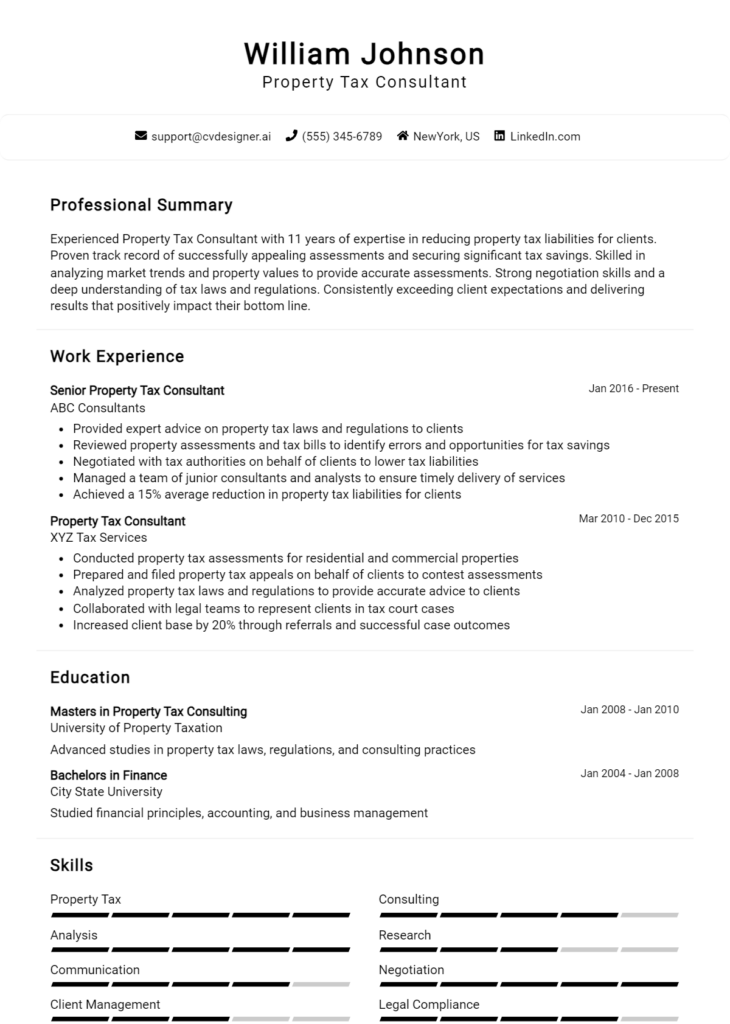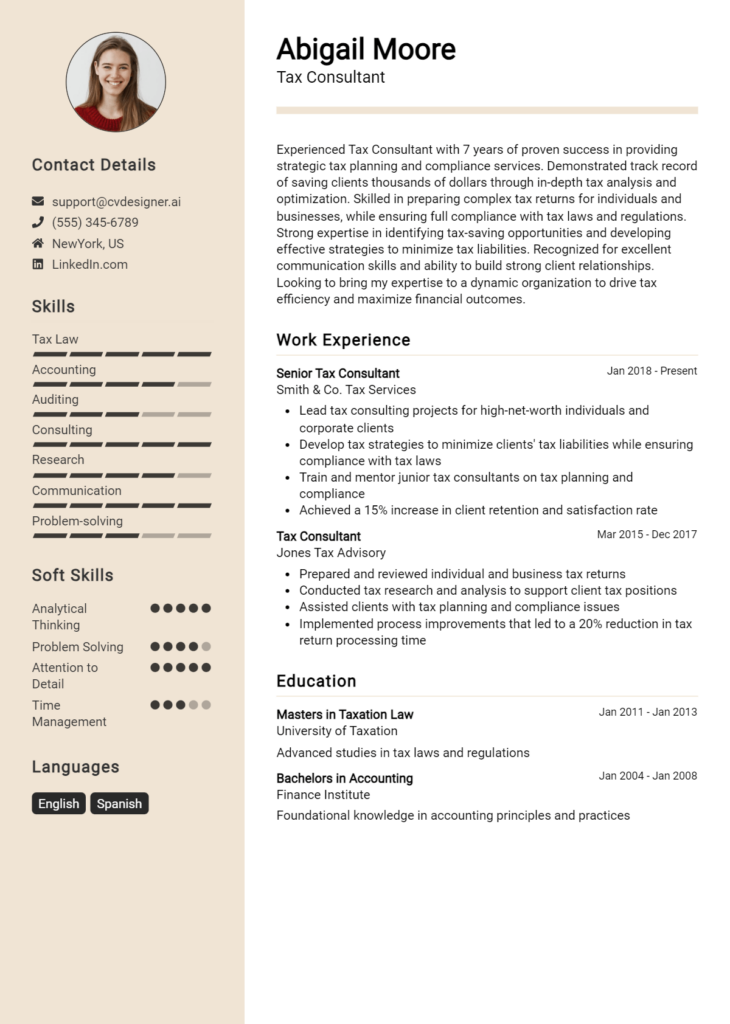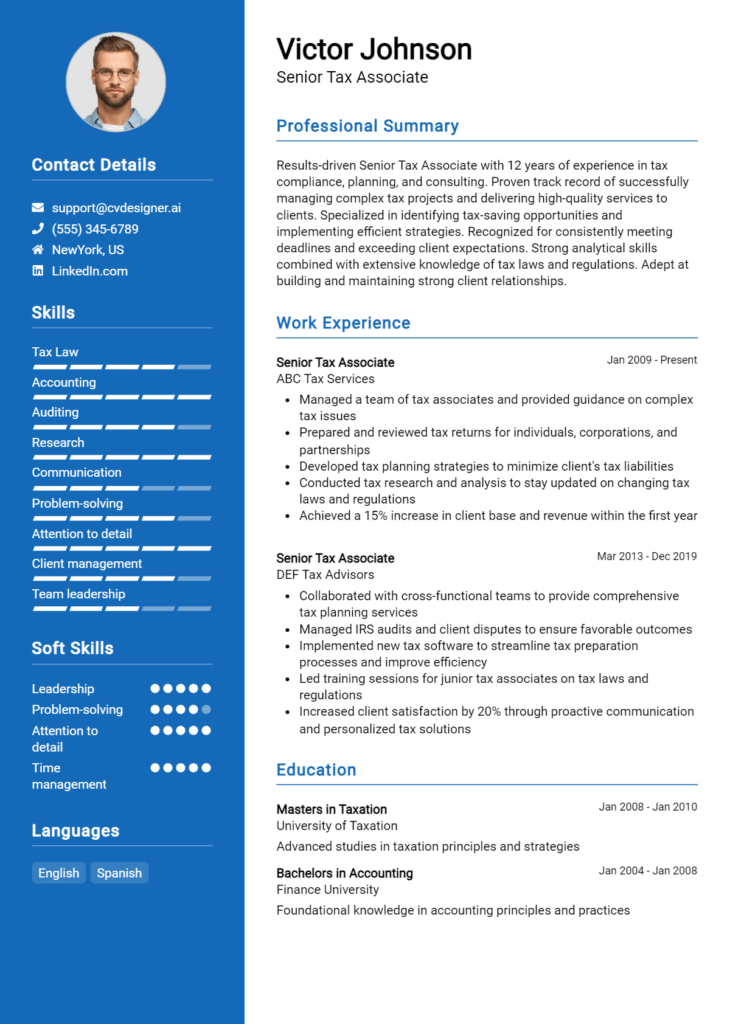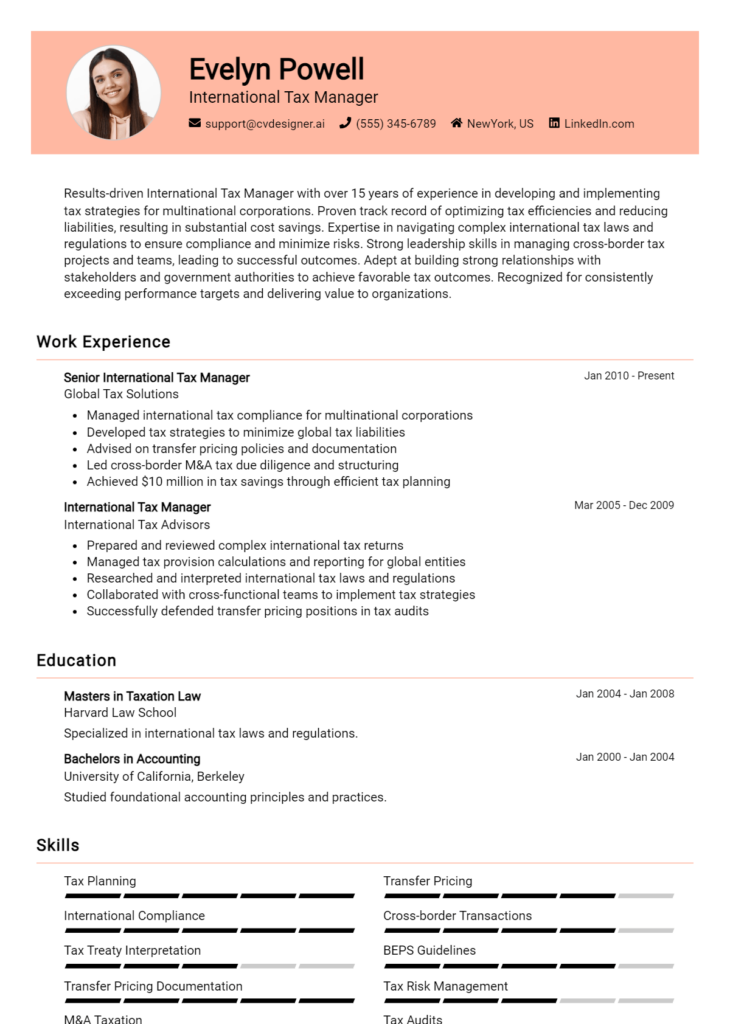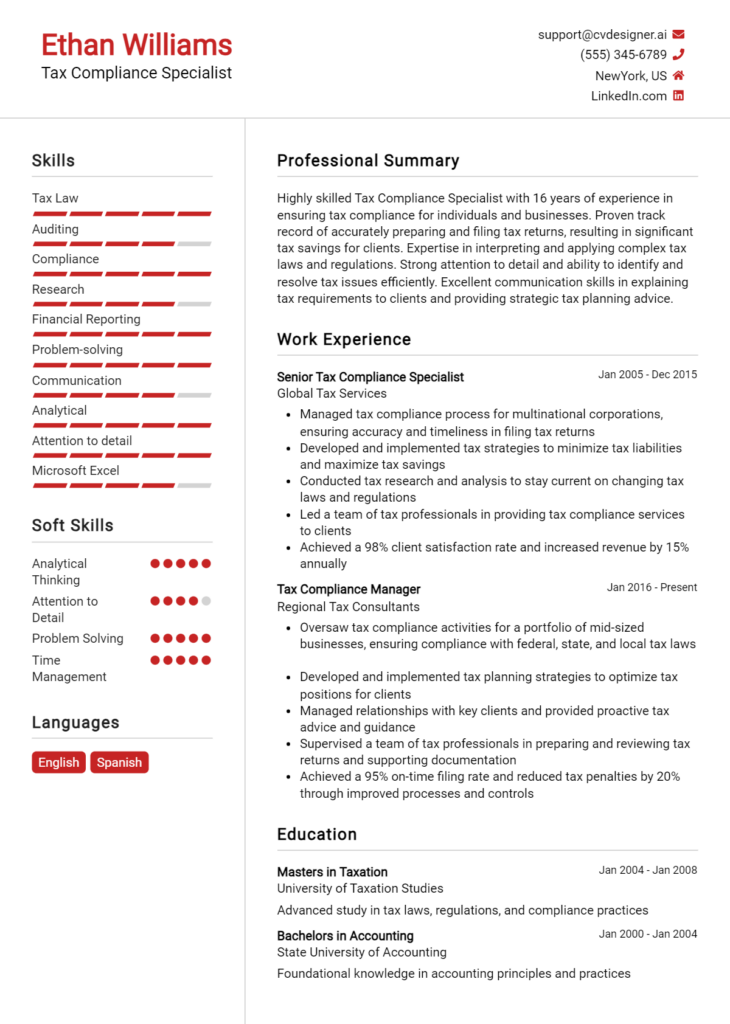Indirect Tax Manager Core Responsibilities
An Indirect Tax Manager plays a crucial role in navigating complex tax regulations and compliance across various departments, ensuring that the organization adheres to indirect tax laws. This position requires a blend of technical knowledge, operational expertise, and strong problem-solving skills to effectively manage tax strategies and optimize processes. By collaborating with finance, legal, and operations teams, the Indirect Tax Manager contributes significantly to the organization's financial health and strategic goals. A well-structured resume highlighting these qualifications can greatly enhance a candidate's prospects in this competitive field.
Common Responsibilities Listed on Indirect Tax Manager Resume
- Oversee indirect tax compliance and reporting across jurisdictions.
- Develop and implement tax strategies that minimize liabilities.
- Conduct audits and reviews of tax processes to ensure accuracy.
- Collaborate with cross-functional teams to align tax practices with business objectives.
- Advise on the tax implications of business transactions and contracts.
- Stay updated on changes in tax legislation and regulations.
- Manage relationships with external tax authorities and advisors.
- Provide training and guidance to internal teams on indirect tax matters.
- Analyze data to identify tax opportunities and risks.
- Prepare and review indirect tax returns and filings.
- Support tax technology initiatives and integration of systems.
- Advocate for best practices in tax compliance and reporting.
High-Level Resume Tips for Indirect Tax Manager Professionals
A well-crafted resume is essential for Indirect Tax Manager professionals, serving as the first impression a candidate makes on a potential employer. In a competitive job market, your resume must effectively showcase your skills, achievements, and industry knowledge to stand out from other applicants. It’s not just a summary of your work history; it’s a powerful marketing tool that can open doors to exciting career opportunities. This guide will provide practical and actionable resume tips specifically tailored for Indirect Tax Manager professionals, ensuring your document not only gets noticed but also highlights why you’re the ideal candidate for the role.
Top Resume Tips for Indirect Tax Manager Professionals
- Tailor your resume to the job description by incorporating relevant keywords and phrases that match the requirements of the position.
- Highlight your relevant experience in indirect tax compliance, planning, and strategy to demonstrate your expertise in the field.
- Quantify your achievements with specific metrics, such as percentage savings on tax liabilities or successful audits, to illustrate your impact.
- Showcase industry-specific skills such as knowledge of VAT, GST, sales tax, and international tax regulations that are crucial for the role.
- Include any certifications or professional qualifications, such as CPA or CTA, to enhance your credibility and qualifications.
- Utilize a clean, professional format that allows for easy reading and highlights the most important sections of your resume.
- Incorporate examples of any leadership or team collaboration experiences that showcase your ability to manage projects and lead teams effectively.
- Keep your resume concise; aim for one to two pages, focusing on the most relevant and impactful information.
- Use action verbs to describe your responsibilities and accomplishments, making your contributions dynamic and engaging.
- Proofread your resume for grammatical errors and inconsistencies to ensure professionalism and attention to detail.
By implementing these tips, you can significantly enhance your resume's effectiveness, increasing your chances of landing a job in the Indirect Tax Manager field. A well-structured and focused resume not only communicates your qualifications but also reflects your professionalism and commitment to your career, setting you apart in a competitive landscape.
Why Resume Headlines & Titles are Important for Indirect Tax Manager
In the competitive field of indirect tax management, crafting a compelling resume is crucial for standing out among numerous applicants. A well-thought-out resume headline or title serves as the first impression, immediately grabbing the attention of hiring managers. This succinct phrase encapsulates a candidate's key qualifications and sets the tone for the rest of the resume. A strong headline should be concise, relevant, and directly aligned with the position being applied for, effectively summarizing the candidate's expertise in a way that resonates with potential employers.
Best Practices for Crafting Resume Headlines for Indirect Tax Manager
- Keep it concise: Aim for a headline that is no longer than 10-12 words.
- Be specific: Use keywords relevant to indirect tax management and the specific job description.
- Highlight key skills: Focus on the most important skills and qualifications that set you apart.
- Use action-oriented language: Incorporate strong verbs to convey confidence and proactivity.
- Tailor to the job: Customize your headline for each application, reflecting the specific requirements of the role.
- Showcase accomplishments: If possible, reference specific achievements that demonstrate your value.
- Maintain professionalism: Ensure the tone and language are appropriate for the industry.
- Consider your audience: Think about what hiring managers in the indirect tax field would want to see in a candidate.
Example Resume Headlines for Indirect Tax Manager
Strong Resume Headlines
Experienced Indirect Tax Manager with Proven Record of Compliance and Efficiency
Strategic Indirect Tax Leader Specializing in International Tax Regulations and Risk Management
Results-Driven Indirect Tax Professional with Expertise in Audit and Reporting
Weak Resume Headlines
Tax Manager
Experienced Professional
Strong headlines are effective because they convey specific qualifications and immediately communicate the candidate's strengths in relation to the indirect tax role. They use precise language and relevant keywords that catch the eye of hiring managers, making it clear that the candidate is well-suited for the position. In contrast, weak headlines fail to impress due to their vagueness and lack of detail, leaving hiring managers uninspired and uncertain about the candidate's capabilities. By avoiding generic terms and focusing on individual strengths, candidates can ensure their resumes stand out in a crowded job market.
Writing an Exceptional Indirect Tax Manager Resume Summary
Crafting a compelling resume summary is crucial for an Indirect Tax Manager, as it serves as the first impression on hiring managers. An exceptional summary quickly captures attention by highlighting key skills, extensive experience, and notable accomplishments that align with the job role. This concise yet impactful overview should be tailored to the specific position being applied for, ensuring that it resonates with the hiring team and encourages them to delve deeper into the candidate's resume.
Best Practices for Writing a Indirect Tax Manager Resume Summary
- Quantify achievements: Use numbers and percentages to illustrate the impact of your work.
- Focus on relevant skills: Highlight specific skills that are directly applicable to the role of an Indirect Tax Manager.
- Tailor the summary: Customize the summary for each job application to match the job description.
- Be concise: Keep the summary brief, ideally around 3-5 sentences, to maintain the reader's attention.
- Use action verbs: Start sentences with strong action verbs to convey a sense of initiative and energy.
- Showcase industry knowledge: Demonstrate familiarity with current tax laws and compliance requirements.
- Highlight leadership qualities: If applicable, mention any leadership or team management experience.
- Reflect your professional brand: Ensure the summary aligns with your overall career narrative and professional image.
Example Indirect Tax Manager Resume Summaries
Strong Resume Summaries
Results-driven Indirect Tax Manager with over 8 years of experience in managing multi-million dollar tax compliance projects, reducing operational costs by 20% through process optimization. Proficient in VAT, GST, and international tax regulations, with a strong focus on risk assessment and mitigation strategies.
Dynamic tax professional with a proven track record of successfully leading cross-functional teams in compliance audits, achieving 100% compliance rates across multiple jurisdictions. Expert in leveraging technology to enhance tax reporting processes, resulting in a 30% decrease in preparation time.
Detail-oriented Indirect Tax Manager with 10 years of expertise in indirect tax planning and compliance, recognized for implementing strategies that resulted in a $2 million tax savings over three years. Strong analytical skills paired with extensive knowledge of regulatory frameworks.
Weak Resume Summaries
Experienced tax manager looking for a new opportunity where I can apply my skills.
Tax professional with knowledge of various tax laws and some experience in compliance. Seeking to leverage this experience in a new role.
The examples of strong resume summaries are considered effective because they provide specific outcomes, demonstrate quantifiable achievements, and clearly indicate the candidate's relevance to the Indirect Tax Manager role. In contrast, the weak summaries lack detail and do not highlight any measurable successes or unique qualifications, making them less appealing to hiring managers.
Work Experience Section for Indirect Tax Manager Resume
The work experience section of an Indirect Tax Manager resume is critical as it serves as the primary showcase of a candidate's technical skills, team management capabilities, and ability to deliver high-quality outcomes. This section not only demonstrates the depth of knowledge in indirect tax regulations and compliance but also highlights the candidate's effectiveness in leading teams and collaborating with various stakeholders. By quantifying achievements and aligning experiences with industry standards, candidates can effectively convey their value proposition to potential employers, making a compelling case for their expertise in the field.
Best Practices for Indirect Tax Manager Work Experience
- Emphasize technical expertise by detailing specific tax regulations and compliance strategies implemented.
- Quantify results through metrics such as percentage reductions in tax liabilities or audit compliance rates.
- Highlight leadership experiences that showcase team management and mentoring capabilities.
- Include examples of successful collaboration with cross-functional teams to enhance tax efficiency.
- Utilize action verbs to articulate responsibilities and achievements clearly and dynamically.
- Tailor experiences to align with the requirements of the job description or industry standards.
- Showcase continuous professional development, including certifications or relevant training.
- Incorporate case studies or project examples that reflect problem-solving skills in complex tax situations.
Example Work Experiences for Indirect Tax Manager
Strong Experiences
- Led a team of 5 tax professionals to successfully reduce overall indirect tax liabilities by 20% through strategic planning and implementation of compliance processes.
- Collaborated with finance and operations departments to streamline tax reporting processes, resulting in a 30% decrease in reporting time and improved accuracy.
- Managed the successful completion of a high-stakes audit, achieving a 100% compliance rate with no penalties assessed, while mentoring junior staff throughout the process.
- Developed and executed a training program for new staff on indirect tax compliance, enhancing team knowledge and reducing onboarding time by 25%.
Weak Experiences
- Responsible for tax-related tasks in the department.
- Assisted with audits and compliance activities.
- Worked on tax projects with some success.
- Participated in team meetings to discuss tax strategies.
The examples categorized as strong are considered effective because they provide specific, quantifiable results that demonstrate the candidate's impact on the organization. They highlight leadership and collaboration with concrete achievements that align with industry expectations. Conversely, the weak experiences lack detail and measurable outcomes, making them less compelling and failing to showcase the candidate's capabilities effectively.
Education and Certifications Section for Indirect Tax Manager Resume
The education and certifications section of an Indirect Tax Manager resume is crucial for establishing the candidate's academic foundation and professional qualifications. This section serves as a testament to the candidate's expertise in tax regulations, compliance, and financial management, showcasing their commitment to staying updated in a constantly evolving industry. By including relevant coursework, specialized training, and industry-recognized certifications, candidates can significantly enhance their credibility and demonstrate alignment with the requirements of the role. A well-crafted education and certifications section can set a candidate apart in a competitive job market, highlighting their dedication to continuous learning and professional development.
Best Practices for Indirect Tax Manager Education and Certifications
- Focus on degrees in fields such as Accounting, Finance, or Taxation that are directly relevant to indirect tax management.
- List industry-recognized certifications such as the Chartered Tax Adviser (CTA) or Certified Public Accountant (CPA) to demonstrate expertise.
- Include any relevant continuing education courses or workshops that reflect a commitment to ongoing professional development.
- Provide detailed descriptions of coursework that align with indirect tax regulations, compliance, and best practices.
- Highlight leadership training or management certifications that could enhance the candidate's suitability for managerial roles.
- Consider including any specialized training in technology or software relevant to indirect tax management.
- Prioritize recent and relevant certifications to show current knowledge of tax laws and practices.
- Use clear formatting to ensure this section is easy to read and visually appealing.
Example Education and Certifications for Indirect Tax Manager
Strong Examples
- M.S. in Taxation, University of XYZ, 2021
- Chartered Tax Adviser (CTA), 2022
- Bachelor of Science in Accounting, ABC University, 2018
- Advanced Indirect Taxation Workshop, Tax Institute, 2023
Weak Examples
- Associate Degree in General Studies, Community College, 2015
- Outdated CPA certification from 2010 (inactive)
- Certificate in Basic Accounting, Online Course, 2017
- Bachelor’s in English Literature, University of DEF, 2016
The strong examples are considered effective as they reflect relevant degrees and certifications that align closely with the responsibilities of an Indirect Tax Manager. They demonstrate a solid academic background and a commitment to professional qualifications that are current and recognized in the industry. Conversely, the weak examples showcase qualifications that are either outdated, irrelevant to the field of indirect tax, or lack the depth required for the position. This highlights the importance of selecting education and certifications that directly contribute to the candidate's ability to excel in the role.
Top Skills & Keywords for Indirect Tax Manager Resume
As an Indirect Tax Manager, showcasing the right skills on your resume is crucial for standing out in a competitive job market. The role demands a blend of technical knowledge and interpersonal abilities to navigate complex tax regulations, manage compliance, and communicate effectively with various stakeholders. Highlighting both hard and soft skills not only demonstrates your competence in handling indirect tax matters but also your capability to lead teams and drive strategic initiatives. A well-rounded resume will not only capture the attention of hiring managers but also provide a comprehensive view of your potential to contribute to the organization’s goals.
Top Hard & Soft Skills for Indirect Tax Manager
Soft Skills
- Strong analytical thinking
- Excellent communication skills
- Problem-solving abilities
- Leadership and team management
- Attention to detail
- Adaptability and flexibility
- Time management
- Conflict resolution
- Negotiation skills
- Strategic thinking
Hard Skills
- In-depth knowledge of indirect tax regulations (VAT, GST, etc.)
- Tax compliance and reporting
- Tax auditing and risk assessment
- Proficiency in tax software and ERP systems
- Data analysis and interpretation
- Financial modeling
- Knowledge of international tax laws
- Project management
- Understanding of accounting principles
- Ability to conduct tax research and analysis
For more comprehensive insights on skills and how to effectively present your work experience, consider tailoring your resume to reflect your strengths and align with the demands of the role.
Stand Out with a Winning Indirect Tax Manager Cover Letter
I am writing to express my interest in the Indirect Tax Manager position at [Company Name], as advertised on [Job Board/Company Website]. With over [X years] of experience in indirect tax compliance and strategy, I have developed a comprehensive understanding of VAT, GST, and sales tax regulations across multiple jurisdictions. My background includes successfully leading tax audits, implementing effective tax planning strategies, and ensuring compliance with evolving regulations. I am excited about the opportunity to contribute to your esteemed organization and help navigate the complexities of indirect taxation.
In my previous role at [Previous Company Name], I was responsible for overseeing the indirect tax function, where I led a team in preparing and filing returns, managing audit processes, and providing training on compliance requirements. I streamlined reporting processes, which reduced errors and improved efficiency by [X%]. My ability to analyze and interpret tax laws has enabled me to provide strategic insights that have resulted in significant cost savings for the organization. I am particularly proud of my work in developing a comprehensive tax risk management framework that enhanced our compliance posture and minimized exposure to penalties.
I am particularly drawn to [Company Name] because of its commitment to innovation and excellence in the industry. I believe that my proactive approach to indirect tax management aligns perfectly with your organization's goals. I am eager to leverage my analytical skills and collaborative mindset to work closely with cross-functional teams, ensuring that tax implications are considered in business decisions. I am confident that my expertise in compliance, risk management, and strategic planning will make a valuable contribution to your finance team.
Thank you for considering my application. I look forward to the possibility of discussing how my skills and experiences can benefit [Company Name]. I am excited about the opportunity to play a key role in optimizing your indirect tax processes and supporting your organization's growth. Please feel free to contact me at [Your Phone Number] or [Your Email Address] to schedule a discussion.
Common Mistakes to Avoid in a Indirect Tax Manager Resume
When crafting a resume for the role of Indirect Tax Manager, it’s crucial to present your qualifications and experiences effectively. However, many candidates make common mistakes that can detract from their application. These pitfalls can obscure your skills and achievements, making it harder for hiring managers to see your potential. Below are several common mistakes to avoid in your Indirect Tax Manager resume:
Vague Job Descriptions: Failing to provide detailed descriptions of your previous roles can leave hiring managers unsure of your specific responsibilities and achievements. Be clear and precise about your contributions.
Ignoring Keywords: Many companies use Applicant Tracking Systems (ATS) to screen resumes. Neglecting to include relevant keywords from the job description may result in your resume being overlooked.
Overloading with Technical Jargon: While it’s important to showcase your expertise in tax concepts and regulations, using excessive jargon can confuse readers. Aim for clarity and ensure your resume is accessible to non-specialists.
Lack of Quantifiable Achievements: Simply stating your duties isn’t enough. Use quantifiable achievements to demonstrate your impact, such as “Reduced audit discrepancies by 30% through improved compliance procedures.”
Inconsistent Formatting: A cluttered or inconsistent format can make your resume hard to read. Stick to a clean layout with uniform fonts and spacing to enhance readability.
Omitting Soft Skills: While technical skills are vital, ignoring soft skills like communication, teamwork, and leadership can be a mistake. Indirect Tax Managers often work cross-functionally, so highlight these attributes.
Not Tailoring the Resume: Sending out a generic resume can be detrimental. Tailor your resume for each application to reflect the specific requirements and values of the prospective employer.
Excessive Length: A resume that is too lengthy can overwhelm hiring managers. Aim for a concise, focused document that highlights your most relevant experiences and skills, ideally within one to two pages.
Conclusion
As an Indirect Tax Manager, your role is crucial in navigating the complexities of tax regulations and ensuring compliance while optimizing tax strategies for your organization. Key responsibilities typically include managing indirect tax compliance processes, advising on tax implications for various transactions, and collaborating with cross-functional teams to develop tax-efficient strategies.
In this role, strong analytical skills and a detailed understanding of tax laws are essential, along with the ability to communicate effectively with stakeholders at all levels. Continuous learning and staying updated with changes in tax legislation are vital for success in this position.
Given the significance of this role, it is important to present your qualifications and experience effectively in your resume. A well-crafted resume can make a substantial difference in showcasing your expertise and accomplishments to potential employers.
Now is the perfect time to review and enhance your Indirect Tax Manager resume. Utilize resources such as resume templates, resume builder, resume examples, and cover letter templates to create a standout application. Take action today to ensure your resume reflects your skills and experience accurately, helping you to secure the position you desire.

